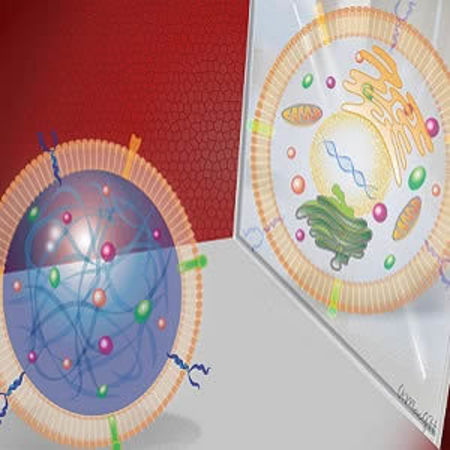Researchers have developed a synthetic version of a cardiac stem cell that could be used in off-the-shelf applications, according to a study published in the journal Nature Communications. These synthetic stem cells offer therapeutic benefits comparable to those from natural stem cells and could reduce some of the risks associated with stem cell therapies.
See Also: Stem Cell Delivery Can Improve Cardiac Function After Infarction
The study shows the synthetic cells are much more durable than human stem cells, and can tolerate harsh freezing and thawing. They also don't have to be derived from the patient's own cells. Moreover, the manufacturing process can be used with other types of stem cells.
"We are hoping that this may be a first step toward a truly off-the-shelf stem cell product that would enable people to receive beneficial stem cell therapies when they're needed, without costly delays," says Ke Cheng, associate professor of molecular biomedical sciences at North Carolina State University, associate professor in the joint biomedical engineering programme at NC State and the University of North Carolina at Chapel Hill, and leader of the research team.
Stem cell therapies work by promoting endogenous repair, meaning they aid damaged tissue in repairing itself by secreting "paracrine factors," including proteins and genetic materials. While stem cell therapies can be effective, they are also associated with some risks of both tumour growth and immune rejection. Also, the cells themselves are very fragile, requiring careful storage and a multi-step process of typing and characterisation before they can be used.
The synthetic cells that Cheng's team created could offer therapeutic benefits to patients without the associated risks. The researchers fabricated a cell-mimicking microparticle (CMMP) from poly (lactic-co-glycolic acid) or PLGA, a biodegradable and biocompatible polymer. The team then harvested growth factor proteins from cultured human cardiac stem cells and added them to the PLGA. Finally, they coated the particle with cardiac stem cell membrane.
"We took the cargo and the shell of the stem cell and packaged it into a biodegradable particle," says Cheng.
Results of in vitro tests showed that both the CMMP and cardiac stem cell promoted the growth of cardiac muscle cells. The researchers also tested the CMMP in a mouse model with myocardial infarction, and found that its ability to bind to cardiac tissue and promote growth after a heart attack was comparable to that of cardiac stem cells. Due to its structure, CMMP cannot replicate – reducing the risk of tumour formation.
"The synthetic cells operate much the same way a deactivated vaccine works," Cheng explains. "Their membranes allow them to bypass the immune response, bind to cardiac tissue, release the growth factors and generate repair, but they cannot amplify by themselves. So you get the benefits of stem cell therapy without risks."
Source: North Carolina State University
Image Credit: Alice Harvey, NC State University
References:
Tang J, Shen D, Caranasos TG, Wang Z, Allen TA, Vandergriff A, Hensley MT, Din PU, Cors J, Li T, Zhang J, Ken Q, Cheng K (2016) Therapeutic microparticles functionalized with biomimetic cardiac stem cell membranes and secretome. Nat Commun, doi: 10.1038/NCOMMS13724
Latest Articles
Synthetic Cardiac Stem Cell, natural stem cells, stem cell therapies, cardiac tissue
Researchers have developed a synthetic version of a cardiac stem cell that could be used in off-the-shelf applications, according to a study published in the journal Nature Communications.























